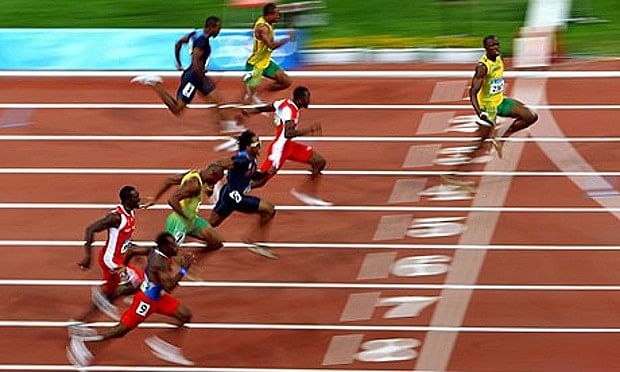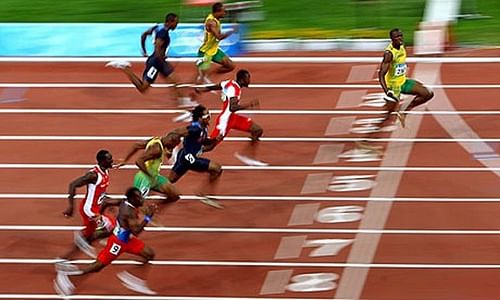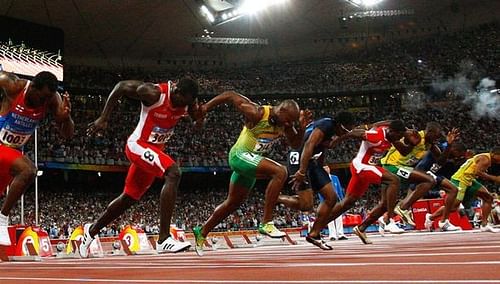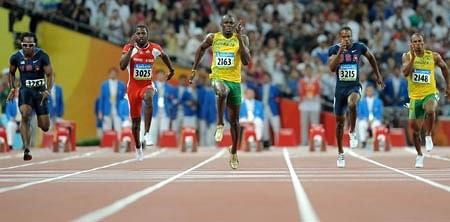
How Usain Bolt transformed the world of athletics in 9.69 seconds

Beijing, 16th August, 2008
10.26 pm;
“YOOUUUSAAAAAAIN BOLT” screams the voice across the stadium PA system. The lanky young Jamaican, all of 21 and running in the biggest race of his life, looks up as if someone had just called out his name while he was at his favourite pub back in Trelawney sipping on a cold one, without a care in the world. The camera focuses in on him, and now that he has the attention of the world, he breaks into a little jig; and tells the stadium, and the entire watching world, just what the result is going to be – raising his index finger and with that toothy grin, proclaiming he is going to be No. 1.
This should have been an indication of what to come. The start of the 100m is always fascinating, all those sublime physical specimens at their peak, preening and posturing as the whole world looks on. In this ultimate show of adrenaline-pumping machismo, most sprinters are aggressive, pumped up – like Maurice Greene, who would pace up and down like a caged panther.
Others, like the laconic Asafa Powell, offer a glimmer of a smile and a blasé wave of the hand, an acknowledgement of the crowd that is more perfunctory than anything else. What is common though, is that all of them look like their entire being has been consumed with focusing on the 100 metres of track in front of them – they don’t see anything else, they don’t much care for anything else.
Few though have looked so utterly devoid of tension, so completely full of joy. Athletics has seen its fair share of arrogant showmen, but nothing quite like this. There is just no stereotypical way of describing the sight of Usain Bolt prepping at the start of a race – he redefines the term über cool.
10.29 pm; 0.00 seconds
The sprinters lower themselves onto the blocks. Bolt, in lane three, takes a little more time to bring his huge 6’5” frame all the way down than the rest
Tall men don’t usually do well in sprints. Yes, they can cover more ground per stride than shorter men – that bit is the screaming obvious – but they generally take a long time to reach top speed. The archetype of the 100m sprinter has been the same for a long while - well muscled, standing somewhere around about 6 ft. tall, your Maurice Greenes and Tyson Gays of this world. This prototype sprinter has that ideal mix of low center of gravity and long strides. Bolt just doesn’t look like any other sprinter.
Nothing in sprinting is more important than the start – it can make or break your race, and tall men often struggle to get the kind of start that wins Gold medals, and breaks world records. After all, you can’t really beat someone in a drag race over such a short distance if you start slowly, can you?

1.81 seconds
As suspected, Bolt hasn’t had the greatest of starts; his huge frame taking its time to hit top speed. For now, he lags behind the others as the more orthodox sprinters push ahead.
Bolt wasn’t really a 100m runner.
Throughout his career, he had run the 200m, and it is was in that event that he had first come to the notice of the world. As a 15-year-old, he competed in the 2002 World Junior Championships before a home crowd in Kingston, Jamaica. This, instead of aiding the young guy increased the pressure on him, for in Jamaica High School Athletics is pretty much the national passion – nowhere else in the world, would you see jam-packed stadiums for school meets and collegiate events.
(Bolt owes a lot to this system - he has stayed his entire life in Jamaica, sticking to training at the University of Technology rather than follow many others to the US or Canada in search of more state-of-the-art facilities)
He won the gold that day in a time of 20.61 seconds, and he was fast on the way to becoming the “next-big-thing” in athletics. He would go on to compete in a host of other Youth and Regional championships winning accolades everywhere, but the 2004 Athens Olympics proved to be an injury-hampered reality check.
He took on board Glen Mills as his coach, and took on training a bit more seriously. He was still competing mainly in the 200m and 400m sprints, and although he stated a desire to run the 100m, his coach was less than enthusiastic about it.
Mills cited the young man’s tendency to look back at opponents during his sprints and the difficulty he had to smoothly start out of the blocks as the major inhibiting factors. In 2007, though Mills finally gave in and Bolt set a time of 10.03 seconds on his debut tournament run to win gold in the Vardinoyiannia meet.
That success was enough for Bolt. He got hooked.
3.33 seconds
Three seconds in and Bolt has now straightened himself up and is now running at his full, considerable, height.

10.03 was never going to be enough. He continued training for the shorter distance, and in the Jamaica Invitational on the 3rd of May 2008, he set a time of 9.76 seconds – the second fastest recorded time in history, 0.02 behind compatriot Asafa Powell. Few observers could believe how quickly he had improved over the distance – what most professionals took entire careers trying to do, Bolt had done in six months – not just go sub-10s, but also shave an incredible 0.24 seconds (a lifetime in the 100m) from his own Personal Best.
By now, Mills was completely converted into the idea of having his young thoroughbred run the 100m, and told the world, and a very surprised Bolt, that there was even more to come. Later in the same month, Bolt would go on to set a new world record – 9.72 seconds, at the Reebok Grand Prix, in New York.
It was only his fifth senior run over the distance.
5.82 seconds
A little later than two seconds later, Bolt is into his full stride. He has built up so much speed by now that he has started to move ahead of the pack, those wide shoulders rocking back and forth, looking so comfortable that one might have thought he was out for a jog around his little hometown.
Jog. It’s a word people don’t really associate with 100m sprinters; but it’s a word that comes up often when talking about Usain Bolt. He runs so effortlessly, and looks so completely at ease that people would be forgiven for thinking he wasn’t trying – like he was merely out for a jog. The time he clocked in the semifinal a few hours before this race epitomized that – he quite literally strolled to the finish line in 9.85 seconds.
This running fast lark just seems too easy for him.
8.12 seconds
By now, three-fourth of the track has been covered and it looks like Bolt is running a race of his own. Forget photo finish, it is doubtful that the other competitors would even get into the same damn photo frame. After catching up with everyone post that slow start, he has quite simply accelerated away as if everyone else was just standing still.
And that wasn’t what was incredible, looking to his left and right to gauge where his competitors were; he raised his hands wide and stopped running hard.
In professional sport, especially in Track and Field, nothing is conceived as more important that form and technique. In just this race alone, Bolt showed that he gave about as much of damn about preconceived notions as he did about pre-match nerves. Shoulders rocking back and forth like a ship at sea, body anything but a straight line, his techniques is nowhere near what the text book prescribes.
As for the cardinal sin of looking back at his competition, does it really matter if you are this fast?
9.21 seconds
By the time he reached 80-odd metres, Bolt stopped sprinting. He quite simply stopped. In the 100m final of the bloody Olympic Games! He stopped sprinting. And then, he thumped his chest like a victorious warrior of yore, proudly proclaiming his victory.
This simply wasn’t done. In a sport where athletes are obsessed with shaving hundredths, even thousandths, of a second of their times, this was simply without precedent. NOBODY DID THINGS LIKE THIS! Paraphrasing the great Michael Johnson himself (who reacted with the same childish astonishment and glee as the rest of us), nobody shutdowns at 90m of a 100m race, not least in an Olympic final!
9.69 seconds
FINISH!
Despite relying on pure momentum to get him through the finish line, Usain Bolt has smashed his own world record. He crossed the line in 9.69 seconds. But, it wasn’t the time that was important here. It was how he had done it.
Quite simply, the young Jamaican had blown the world’s collective mind. Bolt was pure, primal, joyous. The guy was simply reveling in the joy of running faster than anyone else in the world and who could blame him. In the sanitized, professional, almost workman-like world of professional athletics, Lightning Bolt was a much needed breath of fresh air. Entertainer extraordinaire, showmanship incarnate, Bolt was pure theatre – in the purest, most unadulterated sense of the term.
For many the Olympics had begun to lose its sheen and the prime event of the Olympics, the one most sports journalists are honour bound to call “the blue riband event”, had become not quite as exciting as it used to be -– the multitude of drug scandals and the not-so fast timings (no-one had set a World Record in the Olympics since Donovan Bailey did it in Atlanta’96) not helping the cause one bit.
Usain Bolt changed all that in a breathtaking, mind-bending, history-making 9.69 seconds.
Singlehandedly, Bolt made running, and running fast, popular again
Epilogue
This kind of thing happens once in a lifetime for most people. Usain Bolt, though, isn’t like most people. So, four days after his 100m heroics, he would proceed to blow everyone’s minds again with a superlative 19.30 in his pet 200m; eschewing the celebrations to put his head down and beat Michael Johnson’s legendary and seemingly unbreakable 19.32 set in Atlanta ’96. He then went on team up with Nesta Carter, Michael Frater and Asafa Powell to absolutely smash the 4x100 World and Olympic Records with an incredible run of 37.10 seconds.
Three races. Three Gold Medals. Three World Records. Usain Bolt had arrived at the big stage, and the world of athletics would never be the same again.